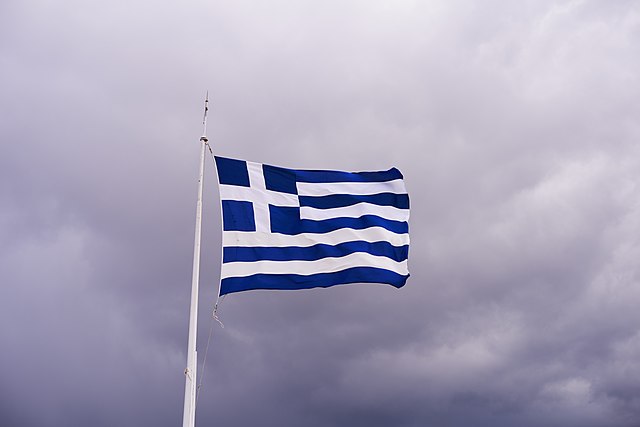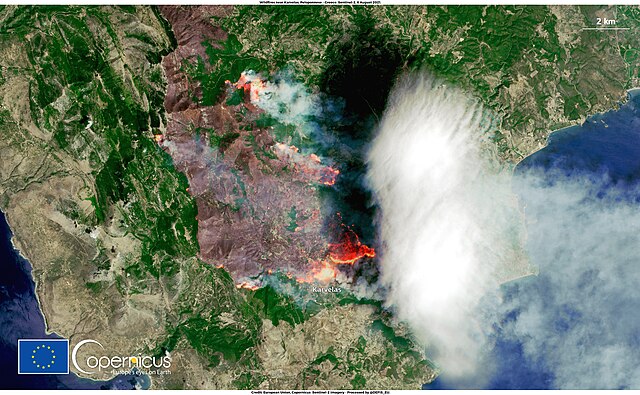
Living in Greece, the extremes of climate change are more apparent than I was prepared for. When I moved here two years ago, I experienced a heat wave within the first month of my living here. The longest on record, some said. That winter would bring us the most snow Athens has seen in over 200 years as well.
This year, the out-of-control weather exceeded even those expectations. Between July and September, devastation was wrought on both ends of the elemental scale. Some will remember my piece a couple of months ago on Greek wildfires. This summer saw a record heat wave of temperatures surpassing 45 degrees in the capital of Athens for over a week straight. Rhodes burned for 9 days uninterrupted, leaving a permanent scar across her ancient forests. Corfu, Evia, and Athens saw huge fires causing mass evacuations. In response, I hosted a worldwide ritual to appeal to the fire spirits to end the fires.

The national flag of Greece on the Acropolis of Athens, [Photo Credit: George E. Koronaios CCA-SA 4.0
Many folks who attended asked me why I didn’t ask for rain. I answered, “That would cause damage, too”.
In early September, that was sadly exemplified by floods that caused destruction throughout central Greece and several islands. Animal rescue organizations and emergency services worked around the clock throughout the first weeks of September to bring refuge to as many creatures and people as possible; cats and dogs are still being accounted for nearly two weeks later.
In the wake of these tragedies, it’s impossible not to feel the presence of the Gods behind each storm cloud, or in each ray of heat lightning. But is it wrath? Vengeance? Destruction brought onto humans by our hubris? Yes and no. In the weeks following the floods, the wildfire risk is in the green, and the land has seemed to release a collective sigh. Throughout these tragedies, it’s been clear that the elementals and the land spirits are just as tired and stressed as the humans and animals affected. These acts are brought on by humans, no doubt; but that only means it falls to us to be a part of the solutions.
Nature can recover. It can survive. But survival mode isn’t meant to be the default. How can we and nature thrive amidst these changes? Now that the extreme weather is over (at least for a spell) the dialogue of what can be done to protect, reinforce, and strengthen ourselves against the next onslaught of extreme weather can begin.
In Greece, this involves appeals to the government to hopefully instigate change in the way wildfires are watched for. New helicopters and training programs have already begun, building on the initiatives started in 2021 after that particular record year of wildfires (the “record year” trend isn’t news: each year sets new records of extremes for many types of weather across the globe). The people are also appealing to the government to reinstate forest rangers in neglected areas. Upgrades and expansions to the forestry industry and their ranger program are significantly lacking. Since the 1970s, Greece has gradually reduced its staff and training. These areas most neglected by rangers are the ones most affected by wildfires.
In every country on earth, it’s the government that needs to make the biggest changes. This can leave the majority of people feeling disenchanted with trying. But the land is giving us the chance as individuals to do what we can, too. To prepare ourselves and our own backyards, at the least. We can open up a dialogue between ourselves and the land, and find a way to reclaim power and protection for our homes and families, even if we can’t reverse the damage done on a larger scale.

This image, acquired by one of the Copernicus Sentinel-2 satellites on 6 August 2021, shows the area near Karvelas in Peloponnese where a large fire has burnt more than 70 km2. Dozens of devastating fires are burning throughout Greece, triggered by a severe heatwave and strong winds. [Photo Credit: European Union, Copernicus Sentinel-2 imagery]
Across the globe, people are facing extreme weather in every season. Keeping a record is bearing witness. As animists, witches, pagans, druids, and the otherwise environmentally-conscious readership of the Wild Hunt, it’s up to us to keep an eye on these elemental shifts. Know when they might start each year. Attune to your local landscape to feel when the energy is off and a storm of more epic proportions might be coming.
Consider the ways to protect your land. Know the risks of your area — mudslides, flooding, tornados, hurricanes, wildfires… and research the solutions. Planting native plants that absorb and hold water is a way to protect your land from wildfires. Having plants with extensive root networks that absorb a lot of water quickly is great protection against flash flooding. Likewise, they can be effective protection against rising water levels, if you live shoreside. Be aware of the height of trees and their fall radius if extreme winds of any kind come your way.
Ask the land what it needs. Be observant in all four seasons, and notice the changes from year to year. Be open to new suggestions. Be ready to explain to your neighbors what they could do better to help the earth. Stop raking leaves. Plant pollinator-friendly plants, provide bird baths and feeders out for animals, and shelter from the sun in extreme heat. Are bats dying out in your area? Bat houses are inexpensive ways to give them safe shelter and foster their populations. These seemingly small things are the way we can re-empower ourselves through a relationship with the land, and find a way back to standing with the land instead of against it.
The actions of humans aren’t on our individual shoulders — we don’t have to take these extreme weather events sitting down. They’re not the punishment of the gods, they are our own undoing. Though we can’t undo what we’ve done, we can protect ourselves, one conversation with the land at a time.
The Wild Hunt is not responsible for links to external content.
To join a conversation on this post:
Visit our The Wild Hunt subreddit! Point your favorite browser to https://www.reddit.com/r/The_Wild_Hunt_News/, then click “JOIN”. Make sure to click the bell, too, to be notified of new articles posted to our subreddit.